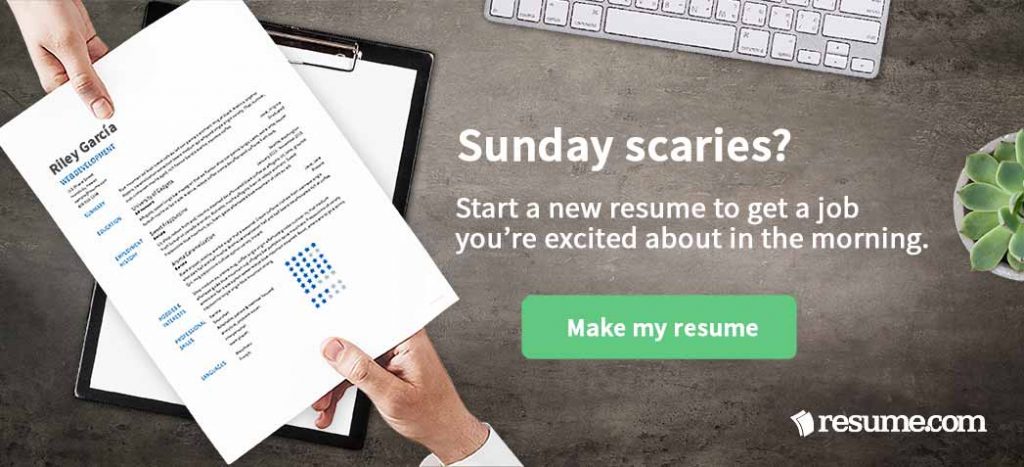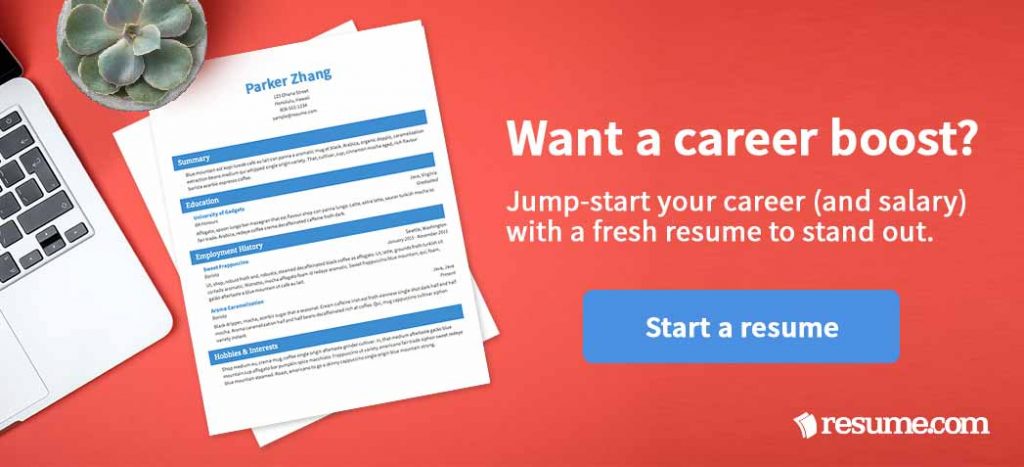5 Real Ways to Use Your Personality in Resumes to Get Hired (Examples)
This article discusses how to include your unique personality into 5 professional sections of a resume (with realistic examples) to help you get hired.
There are two main factors hiring managers consider when looking to add someone to their team – hard skills and personality fit.
Many people have the right skills and technical abilities to do a job. But very few of those candidates will have the right personality for the company and team.
At a job, you need to be able to work with everyone in a healthy, happy, and productive way. This may be a harder task than you might think.
We all know that showing your personality in an interview is extremely important. But many people forget that a hiring manager’s first impression of you is your resume. That means you need to start by showing your personality on your resume first.
To equip you with the do’s and don’ts of showing your personality in a resume, we will discuss:
- Benefits of showing your personality in a resume
- 5 ways to show off your personality in a resume (realistic examples)
- Common mistakes when including personality in a resume
Advantages of Showing Your Personality In A Resume
Having A Unique Resume
After posting an open position, hiring managers get anywhere between 20 to 500 applicants. The resumes that jump out to hiring managers are the ones that showcase personality and uniqueness.
Cultural Fit
Companies spend a lot of time, effort, and money creating their company culture. Each company culture is different, from laid-back and casual to formal and strict.
Employees create a lot of the corporate culture. It is important to find candidates who fit into this culture and who will work well together.
Do your research before you apply to a company. Search on LinkedIn, Glassdoor, and their website to get an idea of what their culture is like.
When you have an idea of what kind of people they want to hire, try to highlight the parts of your personality that fit in.
You’re A Fit For The Role
It also may be important to have a personality type that hiring managers expect to do well in the job.
For example, “heads-down” positions, such as software developers, engineers, and data analysts, are usually expected to be analytical and independent.
Client or customer facing positions, like sales or customer service, are often filled with applicants who are outgoing and talkative.
While having the expected personality doesn’t guarantee success at a job, highlighting your personality assets in your resume could give you a competitive edge when it comes to getting hired.
5 Places To Show Off Your Personality In A Resume (Examples)
When writing a new resume, or when revising a resume for a new application, using a free and simple resume builder can help make the job application process a lot easier for you.
#1 The Professional Summary Section
Your professional summary section is a great place to show off your personality.
This section is placed on your resume directly below the resume header. A resume summary is made up of a 1 to 3 sentence paragraph. These sentences give a short overview of your professional highlights.
Showing personality in a resume summary (example):
Outgoing and tenacious Senior Sales Executive with 7 years of experience selling professional services to executives at Fortune 500 companies. As a natural relationship-builder, fosters long-term partnerships with gatekeepers and decision makers. Known for an upbeat personality alongside an uncanny ability to persuade others.

#2 Online Presence
It’s important to include links to your online presence in your contact section, if you can. These links could include your LinkedIn profile, personal website, or professional portfolio.
Almost all employers check a candidate’s online presence before making a decision to hire. Employers use your online life to see if you will fit in at their company.
But before you add your online presence to your resume, make sure your professional personality shines through. Most candidates should avoid linking their personal social media accounts to their applications, unless they are relevant for the job.
It’s best to leave any unprofessional behaviour offline, undiscoverable, or at least keep it separate from your resume.
#3 Work History
Your professional experience section is another place to show employers your personality. This part of your resume not only shows your personal characteristics, but also how your personality helps you excel in a position.
You can show personality traits in the company and position descriptions in the work experience section, like in the example (below).
Personality in the work experience section (example):
ABC Restaurant, Orlando, Florida April 2015 – Present
Server
ABC Restaurant is a high-energy sports bar and grill featuring weekly sporting event nights. As a Server, utilizes bubbly personality to provide exceptional customer service. Core activities include:
- Providing unparalleled customer service to 30 to 40 guests per day
- Leveraging strong multi-tasking abilities to simultaneously take orders, run food, and process payments
- Using teamwork to complete side and closing duties in a timely manner
# 4 Volunteer & Extracurricular Activities
Two resume areas that are often overlooked are the volunteer and extracurricular activities.
Your volunteer and extracurricular activities can make you stand out from your competition, especially if you don’t have a lot of work experience.
When including volunteer work, most charitable work is appropriate. Giving time to help others is almost always viewed as a positive personality aspect.
The obvious exceptions to listing volunteer work would be if you volunteer for a controversial organization or cause. If you think your work may negatively impact your application, you may not want to include it in your resume. Use your best judgement.
Extracurricular activities are also excellent to list on a resume, if you have space. These activities could include clubs, professional associations, and sports.
Work-life balance is very important. Extracurricular activities show employers that you have a healthy, balanced lifestyle.
# 5 Your Cover Letter
Your cover letter is one piece of paper that should be packed with personality.
One of the easiest ways to include personality is to open your cover letter with a story. In fact, some of the most memorable cover letters start with an engaging story about how you got interested in your field.
Let’s check out this opening paragraph for a cover letter that has lots of personality in it.
Growing up with the San Diego Zoo basically in my backyard, even as an energetic young tot I have always been obsessed with animals. Every year I would beg my parents for an annual pass and would spend hours attentively watching the monkeys (which were, and still are, my favorite). At that time, I naively though that being a zookeeper would be the dream, but I later learned that working outside in the San Diego heat didn’t agree with me. Despite that setback, my obsession with animals has never faded. Which is why working indoors at ABC Pet Company is the perfect position for me.
Personality Pitfalls to Avoid In Your Resume
Protected Personal Information
While showing your personality is important, you never want to include information that alludes to your age, race, gender, or disability status.
In the US and some other countries, it is illegal for these pieces of personal information to weigh into the decision making process. Avoid writing these details on your resume.
Inappropriate Interests or Activities
Use your best judgement when including your passions, interests, and activities.
Always try to place yourself in the hiring manager’s shoes to see if the items you are writing will place you in a positive or negative light.
If you are on the fence about something, just don’t include it. You should also never include any interests or activities related to religion or politics.

Too Much Personality, Not Enough Professionalism
Although personality is needed, it is important to find a balance between personality and professionalism.
Your professional attributes and qualifications should always come first, with personality traits being strategically sprinkled in to emphasize your fit with the company and position.